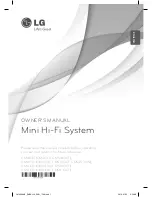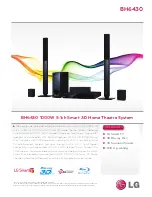
3
HCD-DV2D
CAUTION
Use of controls or adjustments or performance of procedures
other than those specified herein may result in hazardous radiation
exposure.
UNLEADED SOLDER
Boards requiring use of unleaded solder are printed with the lead-
free mark (LF) indicating the solder contains no lead.
(Caution: Some printed circuit boards may not come printed with
the lead free mark due to their particular size)
: LEAD FREE MARK
Unleaded solder has the following characteristics.
•
Unleaded solder melts at a temperature about 40
°
C higher
than ordinary solder.
Ordinary soldering irons can be used but the iron tip has to be
applied to the solder joint for a slightly longer time.
Soldering irons using a temperature regulator should be set to
about 350
°
C.
Caution: The printed pattern (copper foil) may peel away if
the heated tip is applied for too long, so be careful!
•
Strong viscosity
Unleaded solder is more viscou-s (sticky, less prone to flow)
than ordinary solder so use caution not to let solder bridges
occur such as on IC pins, etc.
•
Usable with ordinary solder
It is best to use only unleaded solder but unleaded solder may
also be added to ordinary solder.
Notes on chip component replacement
•
Never reuse a disconnected chip component.
•
Notice that the minus side of a tantalum capacitor may be
damaged by heat.
Flexible Circuit Board Repairing
•
Keep the temperature of the soldering iron around 270
°
C
during repairing.
•
Do not touch the soldering iron on the same conductor of the
circuit board (within 3 times).
•
Be careful not to apply force on the conductor when soldering
or unsoldering.
Laser component in this product is capable of emitting radiation
exceeding the limit for Class 1.
This appliance is classified as
a CLASS 1 LASER product.
The CLASS 1 LASER
PRODUCT MARKING is
located on the rear exterior.
TABLE OF CONTENTS
1.
SERVICING NOTES
................................................
4
2.
GENERAL
...................................................................
5
3.
DISASSEMBLY
3-1.
Disassembly Flow ...........................................................
8
3-2.
Cover Top, DC Fan ..........................................................
9
3-3.
AMP Board, AV Board, Tuner (FM/AM) .......................
9
3-4.
MPEG Board ................................................................... 10
3-5.
DVD Mech Cover A/B .................................................... 10
3-6.
Panel (DVD) .................................................................... 11
3-7.
DVD Loader (KDA898ST) ............................................. 11
3-8.
Front Panel Section ......................................................... 12
3-9.
MAIN Board .................................................................... 12
3-10. Cassette Deck Mechanism (CMAL5Z220C) .................. 13
3-11. KEY Board ...................................................................... 13
3-12. Traverse Mech (1ADOMEZ0412) .................................. 14
3-13. Lid TC ............................................................................. 14
4.
TEST MODE
............................................................... 15
5.
MECHANICAL ADJUSTMENTS
......................... 19
6.
ELECTRICAL ADJUSTMENTS
.......................... 19
7.
DIAGRAMS
7-1.
Block Diagrams — MPEG-1 Section — ....................... 22
— MPEG-2 Section — .................................................... 23
— AUDIO Section — ...................................................... 24
— PANEL/POWER Section — ...................................... 25
7-2.
Printed Wiring Board — MAIN Section-1 — ................ 26
7-3.
Printed Wiring Board — MAIN Section-2 — ................ 27
7-4.
Schematic Diagram — MAIN Section — ...................... 28
7-5.
Printed Wiring Board — MPEG Section-1 — ............... 29
7-6.
Printed Wiring Board — MPEG Section-2 — ............... 30
7-7.
Schematic Diagram — MPEG Section — ..................... 31
7-8.
Printed Wiring Board — KEY Section — ..................... 32
7-9.
Schematic Diagram — KEY Section — ........................ 33
7-10. Printed Wiring Board — AV Section — ......................... 34
7-11. Schematic Diagram — AV Section — ........................... 35
7-12. Printed Wiring Board — AMP,
POWER(EXCEPT AEP, UK, RU, KR, AUS) Section — 36
7-13. Schematic Diagram — AMP Section — ........................ 37
7-14. Schematic Diagram — POWER Section
(E2, E3, E51, SP, TW Model) — .................................... 38
7-15. Schematic Diagram — POWER Section
(US, CND Model) — ...................................................... 39
8.
EXPLODED VIEWS
8-1.
Overall Section ................................................................ 54
8-2.
Front Panel Section ......................................................... 55
8-3.
Chassis Section ................................................................ 56
8-4.
DVD Mechanism Deck Section ...................................... 57
9.
ELECTRICAL PARTS LIST
.................................. 58
•
Abbreviation
AUS : Australian model.
CND : Canadian model.
E2
: 120 V AC area in E model.
E3
: 240 V AC area in E model.
E51 : Chilean and Peruvian model.
KR : Korea model.
RU : Russian model.
SP
: Singapore model.
TW : Taiwan model.




































